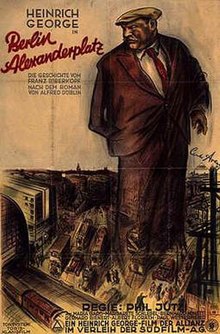Berlin-Alexanderplatz or The Story of Franz Biberkopf (German: Die Geschichte vom Franz Biberkopf) is a 1931 German drama film directed by Phil Jutzi and starring Heinrich George, Maria Bard and Margarete Schlegel. It was adapted from the 1929 novel of the same title by Alfred Döblin, who also co-wrote the screenplay.[1]
| Berlin-Alexanderplatz | |
|---|---|
 | |
| Directed by | Phil Jutzi |
| Written by | |
| Based on | Berlin Alexanderplatz by Alfred Döblin |
| Produced by | |
| Starring | |
| Cinematography | |
| Edited by | Geza Pollatschik |
| Music by | Allan Gray |
Production company | |
| Distributed by | Süd-Film |
Release date |
|
Running time | 90 minutes |
| Country | Germany |
| Language | German |
Plot
editA blue collar Berliner and small-time criminal recently released from prison finds himself being drawn into the Berlin underworld of the 1920s after his prostitute lover is murdered.
"Yet, despite social upheaval, ...the good among the working class still prove able to live an honest and decent life."[2]
Production
editIt was filmed on various locations around Berlin including the Alexanderplatz. Jutzi cut out much of the novel's complex story, preferring to focus on just one character.[3]
The Film Review Board released the film on 30 September 1931, but with the restriction that it was forbidden for young people. The premiere took place on 8 October 1931 in the Berlin Capitol am Zoo. The film was distributed by Südfilm AG (Berlin).[4]
Cast
edit- Heinrich George as Franz Biberkopf
- Maria Bard as Cilly
- Margarete Schlegel as Sonja / Mieze
- Bernhard Minetti as Reinhold
- Gerhard Bienert as Klempner-Karl
- Albert Florath as Pums
- Paul Westermeier as Henschke
- Jakob Tiedtke as Guest at Henschke
- Hans Deppe as Guest at Henschke
- Käthe Haack as Schwester Paula
- Julius Falkenstein as Dieb
- Jakob Tiedtke as Gast bei Henschke
- Siegfried Berisch
- Karel Stepanek
- Ernst Behmer
- Paul Rehkopf
- Anna Müller-Lincke
- Heinrich Schroth
- Heinrich Gretler
- Willi Schur
- Walter Werner
- Karl Harbacher
- Franz Weber
- Paul Kemp
References
edit- ^ John C. Tibbetts, and James M. Welsh, eds. The Encyclopedia of Novels Into Film (2nd ed. 2005) pp 12–14.
- ^ Phillips, Carson. "Berlin Alexanderplatz: the story of Franz Biberkopf" (PDF). holocaustcentre.com. Sarah and Chaim Neuberger Holocaust Education Centre. Archived from the original (PDF) on 4 November 2013. Retrieved 2 November 2013.
- ^ Reimer & Reimer p. 167
- ^ Zhu, Feng (December 2015). "Deutsches Filminstitut – DIF e.V./Deutsches Filmmuseum, Frankfurt am Main (ed.) (2015), Films and Games: Interactions, Berlin: Bertz + Fischer Verlag. 256pp". Film-Philosophy. 19 (1). doi:10.3366/film.2015.0063. ISSN 1466-4615.
Bibliography
edit- Murray, Bruce Arthur (1990). Film and the German Left in the Weimar Republic: From Caligari to Kuhle Wampe. Austin: University of Texas Press. ISBN 978-0-292-72465-5.
- Reimer, Robert C.; Reimer, Carol J. (2010). The A to Z of German Cinema. Lanham, MD: Scarecrow Press. ISBN 978-0-8108-7611-8.
Further reading
edit- Slugan, Mario (2017). Montage as Perceptual Experience: Berlin Alexanderplatz from Döblin to Fassbinder. Rochester, NY: Camden House. ISBN 978-1-64014-005-9.
External links
edit